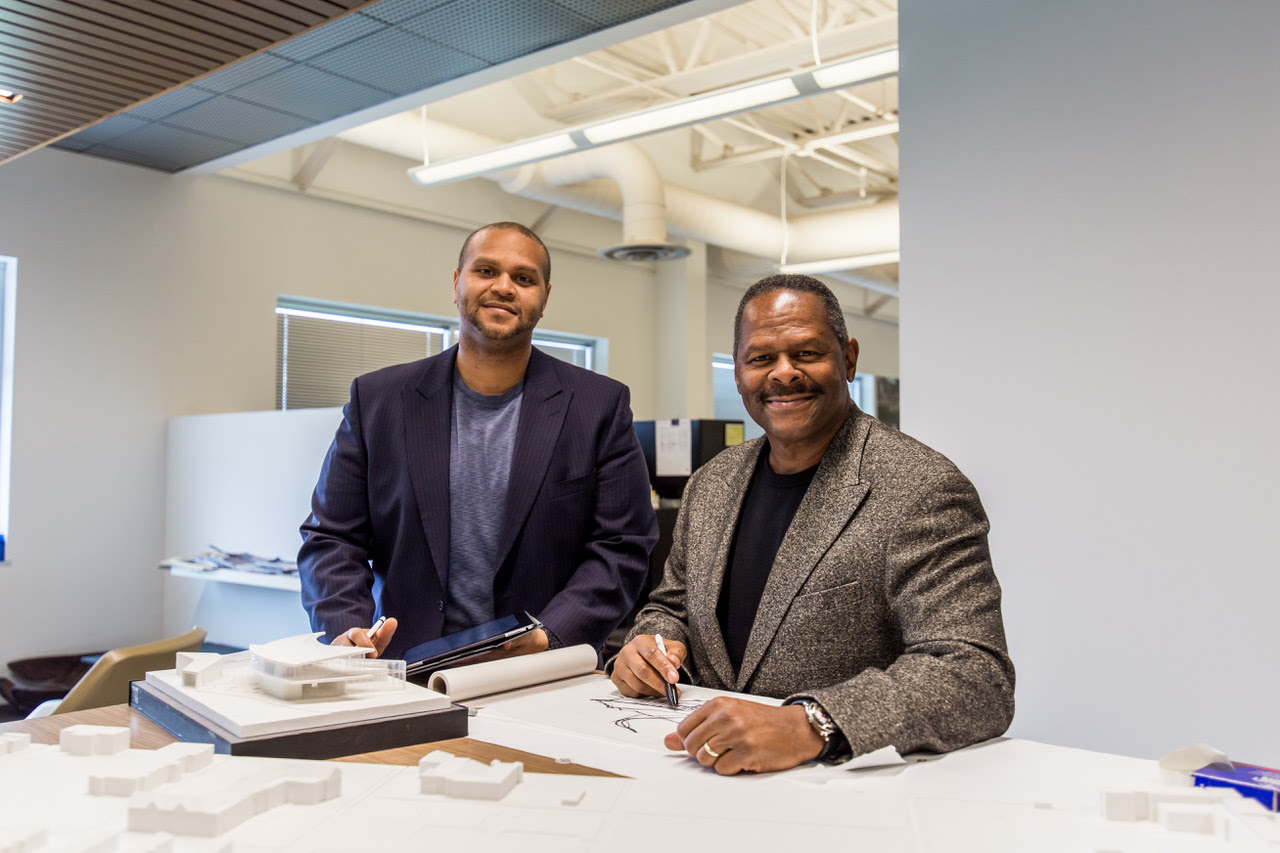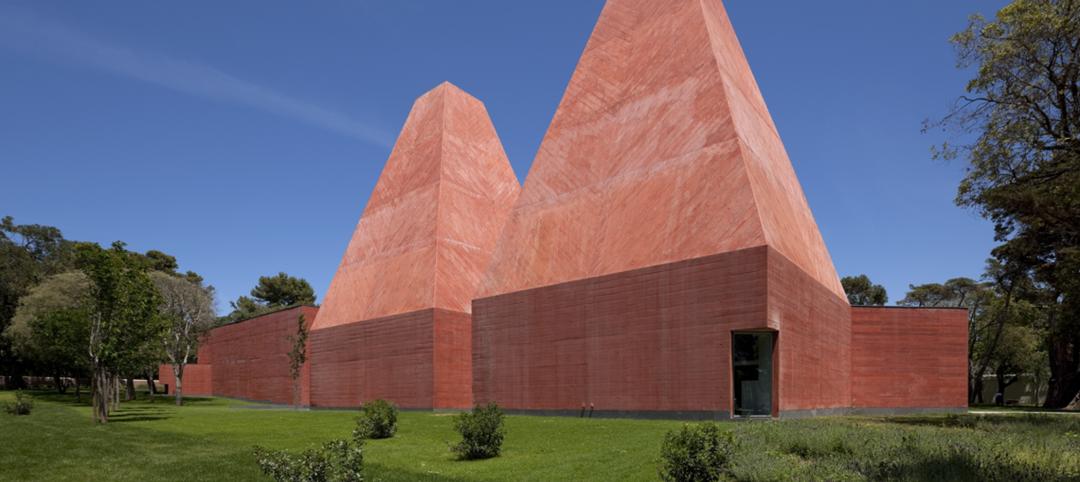COLUMBUS, Ohio - November 21, 2019 – Architectural firm Moody Nolan announced the appointment of Jonathan Moody as its chief executive officer, effective January 1, 2020.
Jonathan Moody has served as president of the Columbus-based firm since 2016, taking day-to-day responsibility for the firm in tandem with his father, CEO and founder Curt Moody. Curt Moody will continue to be fully engaged with the firm as chairman.
Jonathan, an architect, joined the firm in 2011 as a senior associate and was promoted to partner a year later. He was elevated to president three years ago, becoming one of the youngest architectural firm presidents in the United States.
“I am humbled and honored to be named the next CEO of Moody Nolan and look forward to building on the strong foundation established over the past 37 years,” Jonathan Moody said.
Curt Moody, who co-founded the firm in 1982 as a two-person operation, has seen the company grow to 12 offices and become the largest African American-owned architectural firm in the country. As chairman, he will continue to provide active, hands-on leadership and strategic focus.
“I am not stepping away by any means,” Curt Moody said. “But Jonathan has proven himself a highly capable leader, and the time is right to tap the energy and fresh outlook that Jonathan brings to the table.”
Moody Nolan also announced a new four-member Executive Team established to provide a holistic approach to the care and growth of the 12 Moody Nolan offices around the country. While the four Team members will continue in their current project responsibilities, the Team provides a formal structure to facilitate strategic interaction among the firm’s leadership. Executive Team members are:
- Eileen Goodman, Partner and Director of Interior Design now adds Executive Vice President to her title.
- Brian Tibbs, Partner and Director of Nashville Operations now adds Managing Partner to his title.
- David King, Partner and Chief Financial Officer will remain in this position.
- Allen Schaffer, Principal and Director of Sustainable Design, will now divide his time between Sustainable design and his new role of Chief Operating Officer.
“The Executive Team provides a wealth of knowledge and experience that Moody Nolan can leverage when we are confronted with major decisions into the future,” said Jonathan Moody. “Together, we intend to pursue a vision based on growth, impact, design and diversity while respecting and maintaining a culture built over many years.”
About Moody Nolan
Founded in 1982 in Columbus, Ohio, Moody Nolan has grown to encompass 12 cities. In addition to its Columbus headquarters, the firm operates regional offices in Atlanta, Boston, Chicago, Cincinnati, Cleveland, Covington, Dallas, Houston, Nashville, New York City and Washington, D.C. With more than 230 employees, Moody Nolan specializes in corporate, education, sports/recreation, collegiate, healthcare, housing/mixed-use and public service facilities.
More About Jonathan Moody
Education
- 2007-2008 – University of California, Los Angeles, Master of Architecture
- 2002-2007 – Cornell University, Bachelor of Architecture and minor in Africana Studies
Positions Held
- Moody Nolan, Inc., CEO – effective January 2020
- Moody Nolan, Inc., President – January 2016 to present
- Moody Nolan, Inc., Partner – November 2012 to December 2015
- Moody Nolan, Inc., Senior Associate – August 2011
- CannonDesign, Designer – August 2008 to July 2011
- Cornell University, NAAB Archivist – May 2006 to December 2006
- Cornell University, Archival Assistant – June 2006 to August 2006
- Eisenman Architects, Intern – June 2005 to August 2005
- Cornell University, Pre-Freshman Summer Program Advisor – June 2004 to August 2004
- Smoot Construction, Construction Laborer – June 2003 to August 2003 and June 2001 to
August 2001 - Moody Nolan, Inc., Architectural Intern – winters of 2002, 2003, 2004, 2005
Awards
- 2015, AIA Columbus Merit Award: Jonathan’s conceptual design for the Martin Luther King Library won an AIA Columbus Merit Project Award.
- 2010, CannonDesign Ideas Challenges Award: Jonathan was honored with the Ideas Challenge Award, presented by CannonDesign in Los Angeles for innovative project process approach.
- 2007, Alpha Rho Chi Medal for Professionalism: Jonathan received the Alpha Rho Chi Medal, which is offered each year to more than 100 schools of architecture, whose faculty select a graduating senior they feel best exemplifies these qualities. Alpha Rho Chi is the national fraternity for architecture and the allied arts.
- 2006, National Organization of Minority Architects, Student Design Competition: Jonathan won the Student Design Competition sponsored by the National Organization of Minority Architects for a concept design for film school in Queens, New York.
Related Stories
| Apr 5, 2011
Top 10 Buildings: Women in Architecture
Making selections of top buildings this week led to a surprising discovery about the representation of women in architecture, writes Tom Mallory, COO and co-founder, OpenBuildings.com. He discovered that finding female-created architecture, when excluding husband/wife teams, is extremely difficult and often the only work he came across was akin to interior design.
| Apr 5, 2011
What do Chengdu, Lagos, and Chicago have in common?
They’re all “world middleweight cities” that are likely to become regional megacities (10 million people) by 2025—along with Dongguan, Guangzhou, Hangzhou, Shenzhen, Tianjin, and Wuhan (China); Kinshasa (Democratic Republic of the Congo); Jakarta (Indonesia); Lahore (Pakistan); and Chennai (India), according to a new report from McKinsey Global Institute: “Urban World: Mapping the economic power of cities”.
| Mar 30, 2011
China's low-carbon future city
In 2005, the Chinese government announced its target to reduce energy consumption per GDP unit by 20% by the year 2010. After a multi-billion investment, that target has been reached. The Chinese Climate Protection Program’s goal to increase energy efficiency, develop renewable energies, and promote energy savings while reducing pollutant emissions and strengthening environmental protection is reflected in the “Future City” by SBA Design.
| Mar 30, 2011
Is the AEC industry at risk of losing its next generation leaders without better mentoring?
After two or three horrifying years for the AEC industry, we are finally seeing the makings of a turnaround. However, data developed by Kermit Baker as part of the AIA Work-on-the-Boards survey program indicates that between 17% and 22% of design firms are eliminating positions for interns and staff with less than six years of experience. This data suggests the industry is at risk of losing a large segment of its next generation of leaders if something isn't done to improve mentoring across the profession.
| Mar 29, 2011
City's design, transit system can ease gas costs
Some cities in the U.S. are better positioned to deal with rising gas prices than others because of their design and transit systems, according to CEOs for Cities, a Chicago-based nonprofit that works to build stronger cities. The key factor: whether residents have to drive everywhere, or have other options.
| Mar 29, 2011
Chicago’s Willis Tower to become a vertical solar farm
Chicago’s iconic Willis Tower (formerly the Sears Tower) is set to become a massive solar electric plant with the installation of a pilot solar electric glass project.
| Mar 29, 2011
Read up on Amazon.com's new green HQ
Phase IV of Amazon’s new headquarters in Seattle is nearly complete. The company has built 10 of the 11 buildings planned for its new campus in the South Lake Union neighborhood, and is on-track for a 2013 grand opening.
| Mar 29, 2011
Portuguese architect Eduardo Souto de Moura wins Pritzker Architecture Prize
Portugese architect Eduardo Souto de Moura, whose precisely-honed buildings reflect the influence of the late Chicago modernist Mies van der Rohe, is the 2011 winner of the Pritzker Architecture Prize, the field's highest honor.
| Mar 25, 2011
Qatar World Cup may feature carbon-fiber ‘clouds’
Engineers at Qatar University’s Department of Mechanical and Industrial Engineering are busy developing what they believe could act as artificial “clouds,” man-made saucer-type structures suspended over a given soccer stadium, working to shield tens of thousands of spectators from suffocating summer temperatures that regularly top 115 degrees Fahrenheit.












